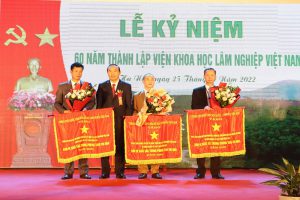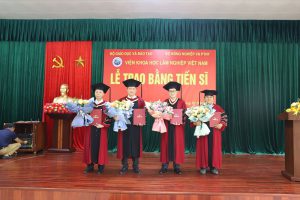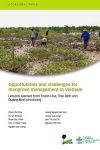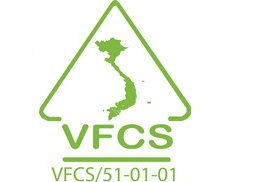1. The List of Bamboo Species in Vietnam
Nguyen Hoang Nghia, Tran Van Tien
Forest Science Institute of Vietnam
Summary
Through field surveys over four years (2003 – 2006) over the whole country, a preliminary list of Bamboo species in Vietnam was established. The list includes 194 Bamboo species of 26 genera, of which 80 species were preliminarily identiflied and named while some of the remaining may be new species for Vietnam. Some new bamboo genera were found during the field surveys, such as the genus Maclurochloa with 17 species; the genus Melocalamus with 10 species and the genus Kinabaluchloa with one species. Some new Bamboo species have been found such as a small Bamboo from Bidoup (a species of Kinabaluchloa) with an appearance similar to species of the same genus in Malaysia (Wong, 1995); one Ampelocalamus species was also found also in Bidoup andsome new Schizostachyum, Gigantochloa and Bambusa species. Some Bamboo genera with high number of species are Bambusa with 55 species, Dendrocalamus with 21, Gigantochloa with 16, Schizostachyum with and Indosasa with 11 species.
Keywords: Bamboo, Bamboo list, field survey
2. Dynamic structure of natural forest in Kon Ha Nung
Tran Van Con
Forest Science Institute of Vietnam
Summary
Species composition, stand structure and stand dynamics of tropical closed evergreen broad leaf rain forest in Kon Ha Nung were studied from 2004 to 2006. Tree diversity expressed as Shannon-Wiener’s index (H’) and importance value as the summation of relative density and relative basal area. N/D distribution was simulated by Weibull function and had the inverse J-shape structure which indicates that the forests are well regenerated and composed of shade-tolerant tree species. High mortality following the emergence of dense seedlings, sharply declined to zero with large trees. Recruitment rates of trees with dbh>10cm were faster than the mortality rates, indicating the population growth in the stands. The results showed that there was a high correspondence in the mortality, recruitment and population changes. Based on this knowledge a dynamic system in terms of D/N structure has been simulated.
Keywords: Tropical closed evergreen broad leaf rain forest, dynamic, natural regeneration, recruitment, mortality, growth, structure, Kon Ha Nung.
3. Diversity of resources of medicinal plants at the Ba Vi National Park
Vu Van Son
Bavi National Park
Nguyen Nghia Thin, Nguyen Thi Kim Thanh
Hanoi National University
Summary
According to surveys, 668 species, 441 genera, 158 families of 5 divisions of the higher plants at the Bavi National Park were used for medicine. The species of the Angiospermae are dominant which represent 96.40% of total medicinal species investigated, then the Polypodiophyta 2.10%, the Lycopodiophyta 0.30%, the Pinophyta 1.05% and the Equisetophyta 0.15%. Ten most diverse families are Euphorbiaceae with 38 species, Asteraceae with 35, Rubiaceae with 26, Moraceae with 24, Fabaceae with 23, Apocynaceae 19, Verbenaceae and Rutaceae 17, Zingiberaceae and Myrsinaceae with 16 loµi. Total species number of those families is 231 which represents 34.58% of all species investigated. The families with 1 species go up to 58 representing 8,68% of all species. Twenty-two genera with more species are: Ficus with 16 species, Ardisia 9, Cinnamomum 7, Piper 6, eight genera namely Schefflera, Gynura, Euphorbia, Maesa, Citrus, Solanum, Callicarpa and Clerodendrum have 5 species.
Keywords: Bavi National Park, traditional medicinal plant,
4. Regeneration of native forest tree species in forest plantations and denuded hills of Namlau commune in Son La Province
Tran Van Do, Nguyen Ba Van
Forest Science Institute of Vietnam
Summary
This study was conducted in Acacia and Eucalyptus plantations and unplanted areas in Son La Province to compare the regeneration of native forest tree species in different plantations and unplanted areas, and to examine the effect of planting densities on the establishment of native forest tree species. Circular plots of 200m2 were used to collect data on the numbers of regenerated native forest tree species and their abundance. Several indices were used to evaluate species diversity. A total of 22 regenerated native forest tree species appeared in the plantation of Acacia auriculiformis and their abundance was 860 trees per ha. The highest natural regeneration was found in A.auriculiformis plantation with a planting density of 1,660 trees per ha. The lowest abundance and diversity was in the plantation of Eucalyptus camaldulensis with 12 regenerated native forest tree species and an abundance of 467 trees per ha.
Keywords: native species regeneration, Acacia auriculiformis ,Acacia mangium, Eucalyptus camaldulensis, unplanted areas.
5. Appraisal of the quality of mangrove plantations as seashore protection forests of the 661 Program in Thai Binh province
Truong Tat Do, Nguyen Kim Oanh
Forest Science Institute of Vietnam
Summary
Mangove forests play an important role in protecting seashore dykes, improving ecological environments and protecting aquatic products resources. Establishment of protection forest belt systems to ensure the protective function of mangrove forests is an urgently needed task to be carried out by the forestry sector of Thai Binh province. Results of the “Assessement of quality of mangrove plantations as seashore protection forests of the 661 Program in the period of 1998 – 2005 in Thai Binh province” showed the planting areas, survival rates, rates of establishment of plantations, growth of forest on different sites, and planting techniques that have been applied. These results are the basis for proposed technical measures to improve the quality of protection mangrove forests planted by 661 Program in the period of 2006 – 2010.
Keywords: Seashore protection forest, mangrove forest, 661 Program, Thai Binh province.
6. The state of forests and forest lands in Soc Son district, Ha Noi capital
Nguyen Van ThinhBui Thanh Hang
Forest Science Institute of Vietnam
Summary
Soc Son is the District of Ha Noi capital with the highest forest land areas. To have a basis for developing forestry projects in the period 2007-2015 in this district, Ha Noi has engaged the Forest Protection Department to evaluate the current status of forests and forest lands, for development of a forest strategy in the next few years.
Keywords: Soc Son district, state of forest and forest land, forest and forest land use.
7. Preliminary research on improvement of the specific gravity of Paulownia fortunei wood
Bui Duy ngoc, Nguyen Dinh HoiNguyen Thi Minh Xuan
Forest Science Institute of Vietnam
Summary
In Vietnam there is an abundant raw material resource of Paulownia fortunei . The advantages of Paulownia fortunei wood are that it displays little warping and deformation but it is not popular for use in wood processing because the wood is light and spongy and cannot make products that resist impacts. Research is underway on improvement of the specific gravity to help correct this serious defect. To improve Paulownia fortunei wood specific gravity P – F adhesive is being tested to soak the wood (non-pressure treatment) before complete hot compression. The experimental samples had average of specific gravity is 0,27 g/cm3 before hot compression and 0,525 g/cm3 after hot compression which was about the average of specific gravity of other woods used in woodworking and production.
Keywords : improvement of specific gravity, Paulownia fortunei wood
8. Research into some properties of forest products preservatives made from Cashew nut peel extract
Bui Van Ai
Forest Science Institute of Vietnam
Summary
Cashew-nut peel extract is a secondary product after processing Cashew nuts. The peel can yield 10 – 15% extract. One research project has investigated this extract as a forest products preservative which can prevent attack by harmful insects. In order to improve the preservative properties of the extract it was treated with chlorine gas. In a further trial diezel oil was selected in order to liquify the preservative chemical products. Some properties of the preservative chemical product were studied. Results of this research can provide a scientific basis for developing new forest products preservatives made from plants..Keywords: forest products preservative chemical products, Cashew-nut peel extract
9. Introduction to Co2Fix V 3.1 model and its application to carbon accounting and other forest values
Duong Tien Duc, Cao Chi Khiem, Bui Thanh Hang
Forest Science Institute of Vietnam
Abstract
This paper provides an introduction to the general conceptual approach of the CO2FIX V 3.1 model, as well as its implementation and examples. This stand level simulation model is a tool which quantifies the carbon stocks and fluxes in forest biomass, soil organic matter and wood products chain. The model is applicable to many difference situations such as afforestation projects, agroforestry systems, and selective logging systems.
This model will provide a powerful tool for Vietnamese foresters for carbon accounting as well as for other forest values.
Keywords: Afforestation, agroforestry, bioenergy, biomass, carbon accounting, carbon sequestration, CDM, forest simulation model, Kyoto protocol
Latest news
- Vietnam Journal of Forest Science Number 3 - 2006
- Vietnam Journal of Forest Science Number 2 - 2006
- Vietnam Journal of Forest Science Number 3-2009
- Vietnam Journal of Forest Science Number 4-2009
- Vietnam Journal of Forest Science Number 1-2009






